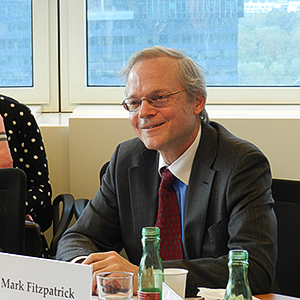

On 15 April 2014, the Vienna Center for Disarmament and Non-Proliferation (VCDNP) hosted a seminar by Mark Fitzpatrick of the International Institute for Strategic Studies (IISS), who provided an overview of his latest publication, "Overcoming Pakistan's Nuclear Dangers." Elena Sokova, executive director of the VCDNP, moderated the event.
Fitzpatrick began by citing the various risks posed by Pakistan's nuclear arsenal. One concern is the potential nexus between nuclear proliferation and terrorism, arising from increasing Islamist fundamentalism and the presence of a very large number of terrorist groups in Pakistan that undermine the security of the state. He also highlighted a possible "insider threat" from within the facility personnel and/or nuclear establishment that could lead to a seizure of fissile materials or even an intact nuclear device from Pakistani nuclear sites, as well as a terrorist attack on nuclear facilities themselves. This risk of seizure, theft, or accident, Fitzpatrick argued, is exacerbated by Islamabad's tendency to move its warheads more frequently than do other nuclear-armed states-a reaction to the persistent paranoia about a possible US strike to disarm Pakistan.
Fitzpatrick also discussed the concerns that Pakistan's nuclear weapons may be less safe than those of other, more established nuclear-armed states; whereas Pakistan's warheads were tested primarily for reliability (i.e. to ensure that the weapons work in case of employment), the United States, for instance, conducted sixty-two nuclear safety tests to reduce the risks of accidental detonation. (This does not imply, Fitzpatrick clarified, that Pakistan should increase the frequency of nuclear weapon tests).
Another cause for concern Fitzpatrick highlighted is the relative lack of attention, paid by either India or Pakistan, to curbing an arms race in the region. South Asia's strategic competition is not only focused on the quantity of nuclear weapons in an adversary's arsenal but also on each other's strategic capabilities, which further fuels an arms race. In addition, the regional race isn't strictly bilateral: while Pakistan seeks to catch up with India, India seeks to acquire the same level of capabilities as China. Pakistan's arsenal is already the fastest growing nuclear arsenal in the world, growing by estimated sixteen nuclear weapons per year. Similarly, India has announced the introduction of sea-based nuclear platforms, and Pakistan has expressed its intention to do the same. This, in conjunction with Indian and Pakistani nuclear strategies, means that a non-existentialist threat to either India or Pakistan could lead to a devastating nuclear exchange, possibly triggered by another large-scale terrorist attack in India akin to the 2008 Mumbai attacks. Indeed, Pakistan vows nuclear retaliation in response to a conventional attack, and India vows nuclear retaliation in response to a nuclear strike. Fitzpatrick stressed that this scenario need not materialize. Pakistani officials have indicated that Islamabad's nuclear build-up could stop by 2020 at around 200 weapons, if the strategic environment is stable enough. Therefore, efforts should be made to stabilize the strategic environment in order to curtail the South Asian nuclear arms race.

To overcome these nuclear dangers, Fitzpatrick proposed that Pakistan be offered "a formula for nuclear normalization" similar-but not identical-to the 2008 US-India nuclear cooperation deal. This path to nuclear normalization would entice Pakistan to adopt policies associated with global nuclear governance and non-proliferation norms. Under this scenario, Fitzpatrick asserted, Pakistan would be required to ratify the Comprehensive-Nuclear-Test-Ban Treaty, suspend all fissile material production, unblock the Fissile Material Cut-off Treaty negotiations, and make other concessions in return for nuclear legitimacy. Islamabad would have to lift a heavy burden of proof that it deserves such recognition because of its damaged track record due to the A. Q. Khan's network operations and the continuing terrorism threats from non-state actors. While such a proposition would reduce nuclear risks in Pakistan and the region, he conceded that options have yet to be explored that would prevent Islamabad's nuclear normalization from undermining non-proliferation efforts elsewhere, such as in North Korea, or weakening the international regime entirely. He further recommended a continuous focus on preventing acts of terrorism as well as efforts to lower the risk of a new Indo-Pakistani war. To this end, bilateral mechanisms should be developed to avoid a fully-fledged arms race and nuclear exchange in South Asia.
By continuing to use the site, you agree to the use of cookies. more information
The cookie settings on this website are set to "allow cookies" to give you the best browsing experience possible. If you continue to use this website without changing your cookie settings or you click "Accept" below then you are consenting to this.